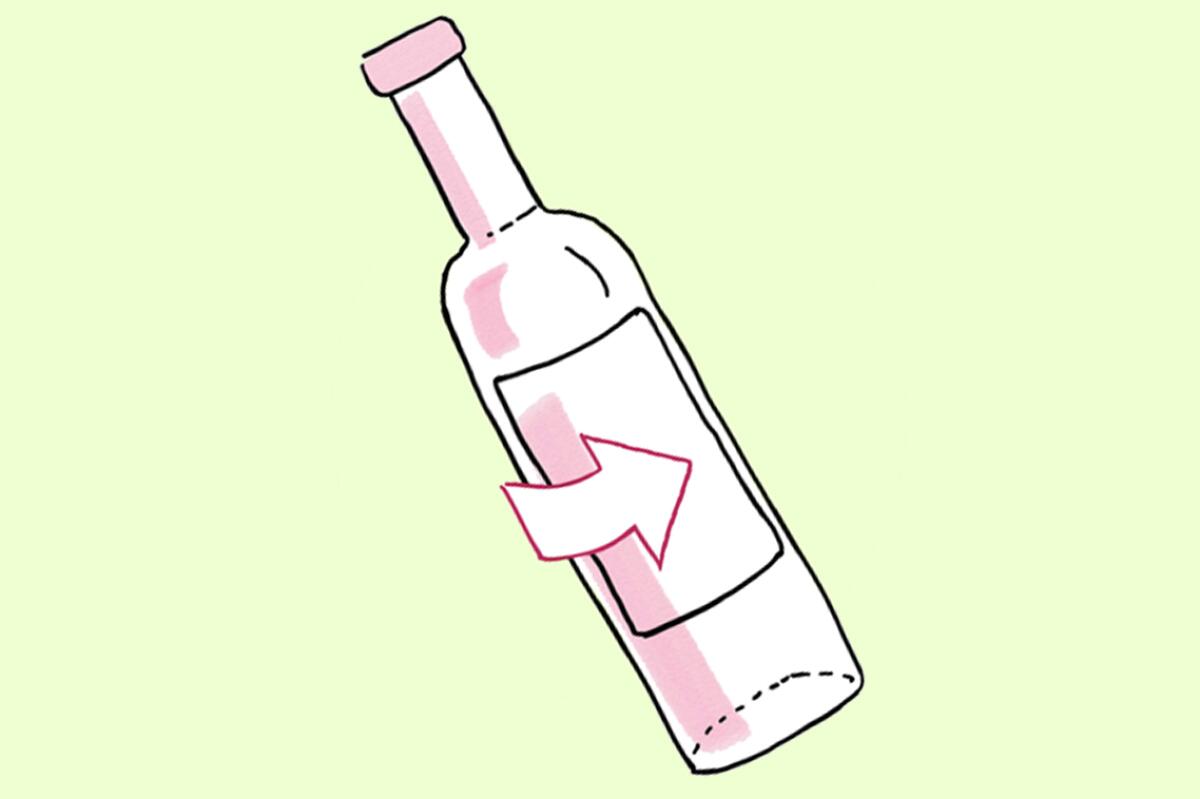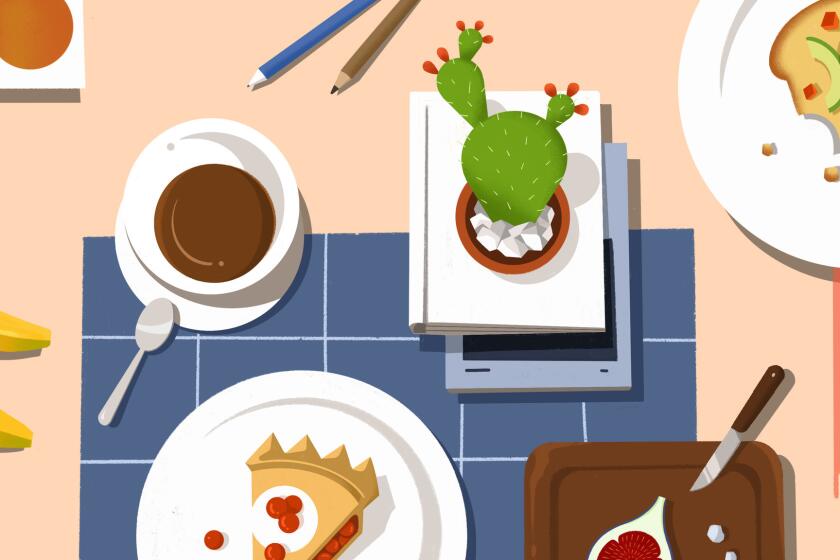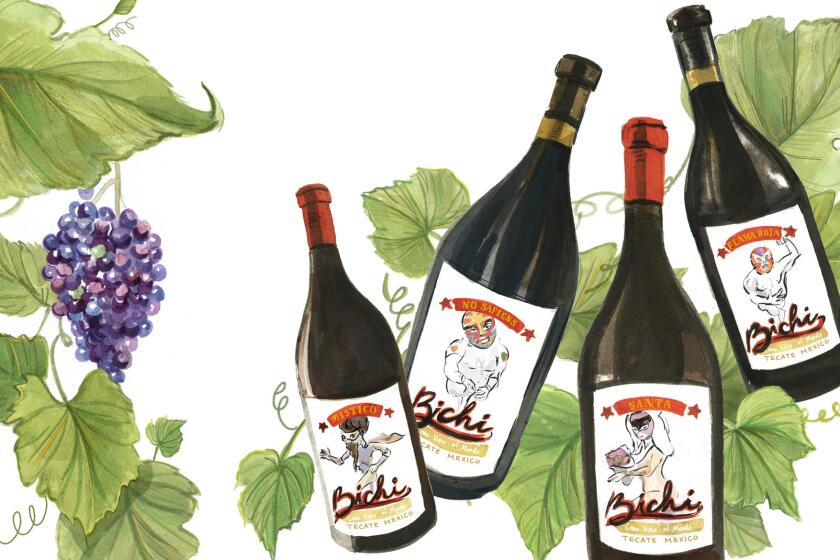The secret to picking the perfect bottle of wine might be on the back label

- Share via
Wine trends change: For young wine drinkers today, seeing a bottle on an Instagram account of a restaurant or influencer they follow can be more powerful than the 100-point scores meted out by old-line wine media. But there’s a less talked-about trick that in-the-know drinkers use when buying global imported wine: The label on the back of the bottle sometimes tells you more than the one on the front.
Shopping by the importer whose label is on the back of the bottle has been a savvy wine hack for decades, a decoder ring for consumers to suss out quality amid the ever-expanding and always changing world of international wine options. Pioneering importers such as Kermit Lynch Wine Merchant, Becky Wasserman & Co., Louis/Dressner and Rosenthal Wine Merchant helped establish the practice for American wine drinkers back in the late 20th century, and it remains a true (if sometimes nuanced) way to shop today, aided and expanded by the work of a new generation of wine importers and distributors.

Newsletter: Sign up for the Tasting Notes newsletter
This is not a universal or fail-safe approach: Most — but not all — domestic wines will not list a distributor on the back label. This, too, varies state by state, but it’s not required by law in California and most distributors don’t bother. “It would be overly laborious” to put labels on domestic wines, says L.A. importer Amy Atwood. “But people can just ask, ‘Which domestic Amy Atwood wines do you have?’ at the wine shop.”
So it is a tactic that applies mostly to imported wines. Why? Wine sales in the United States operate under a complex three-tier system, based on antitrust laws dating back to the 1890s. Under these laws, overseas winemakers must contract with an agent to bring their wines into the country — this is the role of the importer. From there, a separate set of licenses is required to sell to wine shops or bars — this is the role of the distributor. Some distributors work with multiple importers, while other importers are themselves distributors, and every state has subtly different laws related to alcohol sales, which further complicates matters.
It’s helpful to think of importers and distributors as collaborators, working together (sometimes under the same roof) to create a portfolio that represents a point of view reflected in the juice — so if you like one bottle they bring in, it’s worth seeing what else they’ve put their name on. “I think of my role as like an A&R guy for a record label,” says Byron Bates. He’s a co-founder at Goatboy Selections, an influential wine importer based in Paris and New York City.
Noel Tellez is tired.
“I think it’s more like being a curator at an art gallery,” says Helen Johannesen. She’s the founder, owner and buyer at Helen’s Wines, with locations inside the Jon & Vinny’s restaurants on Fairfax Avenue and in Brentwood. On her podcast and with customers, Johannesen has long espoused the wonders of shopping by importer label.
“It’s a tool you can use at the wine shop, or at a restaurant,” she says. Helen’s Wines buys from around 20 different importers and distributors, a number that’s grown significantly from Johannesen’s early years as a wine buyer and restaurant wine list curator. “We’re seeing this convergence of marketplaces right now in Los Angeles. It’s such an exciting time for wine.”
Exciting, booming, spoiled for choice — if it’s a great time to be a wine buyer in Los Angeles, it’s an even better time to be a wine drinker. Here’s a handful of importers and distributors supplying the good stuff from around the world.
Amy Atwood Selections
L.A.-based Amy Atwood Selections is the eponymous brand of California beverage dynamo Amy Atwood. Her work includes importing and distributing a range of wines from California, Australia and Europe, the latter in partnership with lauded importer portfolios from groups like Jenny & François Selections, Savio Soares Selections and SelectioNaturel.
She also co-produces her own range of wines under the Oeno label, based in Sonoma, as well as a new spirit line, Future Gin, made in downtown Los Angeles. “Anybody who sees my name on the back of a label should expect an interesting wine that leans natural,” says Atwood. “But my style runs toward the clean side of natural.” Today she maintains around 300 clients at any given time across California, a who’s who of hip young wine shops, bars and restaurants.
Look for: Back labels including Amy Atwood Selections, Jenny & François and SelectioNaturel.
Top bottles: Amy Atwood helped bring the wines of Austria’s Gut Oggau to California in partnership with New York importer Jenny & François. These wines, with their line-drawn face art on the bottles, are iconic in the natural wine scene. Atwood’s selections from Australia also are noteworthy — look for bright, lively wines from labels like Gentle Folk (Adelaide Hills) and Patrick Sullivan (Yarra Valley).
Sylvester/Rovine
Erin Sylvester opened L.A.-based Sylvester/Rovine Selections in 2016. The project is a direct partnership with New York City-based Zev Rovine Selections, a well-regarded natural wine-focused importer. Sylvester’s role in L.A. is as a distributor for the Rovine portfolio across California — an enviable collection of winemakers with a focus on France, Spain and Sicily.
“Our job as the importer or distributor is to be the best conduit between the producer and the consumer as we can possibly be,” says Sylvester. “I don’t like to put my name on bottles and I only recently put my name on this company. At the end of the day we’re trying to bring the consumer as close to the producer as possible.”
Look for: The Rovine team’s “book” includes distribution of wines from importers like Selections de la Viña and Camille Rivière, all with a focus on minimal intervention and “natural” wines. Keep an eye out for back-of-the-bottle names including Sylvester/Rovine, Zev Rovine, Camille Rivière and Selections de la Viña.
Top bottles: At the L.A. Times Wine Bowl tasting in May, Sylvester/Rovine’s table seriously impressed attendees with a battery of sparsely allocated wines from cult winemakers like Gabrio Bini, who makes wine under the Serragghia label on the tiny Mediterranean island of Pantelleria, and Anders Frederik Steen, an ex-Noma sommelier who makes stunning wines in the Ardèche. She paired these with the wines of Fossil & Fawn, a relatively unknown winemaking duo whose estate-grown Willamette Valley wines embody the excitement and innovation happening now for young winemakers in Oregon.
Goatboy Selections
Over the last five years Goatboy co-founders Byron Bates and Bill Fitch have spun the company into a national concern, partnered with distributors in 10 states and representing up to 50 winemakers at a time, with a focus on France and a growing presence from Spain, Austria and Italy. “We’re a little company,” says Bates, “and we like wines that push the edge.”
Look for: A back label that could double as a punk-rock show poster, featuring white and black block lettering that reads “Goatboy Selections” next to a cartoon interpretation of the brand name: a flying half-human, half-goat deity in the likeness of Silenus, soaring with a bottle of wine.
Top bottles: Thought-provoking, genre-defining natural wines by winemakers like Brendan Tracey and Sebastien David, both from the Loire Valley.
The Source Imports
The Source Imports offers another glimpse of the hybrid importer/distributor model. Much of its portfolio is sourced directly through Source founder Ted Vance’s own importing arm, but that roster is expanded through partnerships with famed Burgundy wine importer Becky Wasserman Selections and Circo Vino, who focus on Austria. If you’re looking to dive into the world of Burgundy, the Source has you covered, offering hundreds of wines from noted producers large and small, ranging on the price scale from surprisingly affordable to positively Burgundian. Even better, the Source offers consumers the ability to shop direct online, shipping nationwide from its warehouse in Sonoma.
Look for: The Source Imports label on the back of each bottle. You can also look for the Becky Wasserman stamp on select Burgundy wines alongside the Source label — if you see it, drink it.
Top bottles: Glorious Burgundy from the likes of Simon Bize, Bruno Clair and Dominique Gruhier, all sourced in partnership with Wasserman, as well as some lovely grower Champagnes by small artisan winemakers including Clos Cazals, Remi Leroy and Guillaume Sergent.
Trumpet Wines
I was turned on to Trumpet Wines when I fell for a simple $20 bottle of Conca de Barbera Parellada from tiny Spanish winemakers Succés Vinicola. I turned the label over to discover Trumpet, a San Francisco-based importer of “lively wine from Spain’s avant-garde.” Trumpet represents around 20 producers, distributed across California’s wine shop, bar and restaurant scene. I love Spanish wine but am always looking to learn and try more of it, so thank goodness for a brand like Trumpet, which offers a laser focus on importing from just one country, providing curious drinkers a useful entry point for discovery.
Look for: The brand’s own label on the back of the bottle, in a graphic depicting elephants and swans.
Top bottles: Definitely start with the aforementioned Succés Vinicola, whose wines represent not just an education and a delight but also a bargain. From there, branch out to the sun-drenched, steep-sloped Priorat wines of Trosset de Porrera, or the preindustrial take on Jerez made by Bodegas Forlong.
More back labels to watch include Percy Selections, Roni Selects, Critical Mass, Terrell Wines (focused on the wines of Georgia), Fifi’s Import, Farm Wine Imports, Palermo Wine Imports, Merchants of Thirst and Soil Expedition.
More to Read
Eat your way across L.A.
Get our weekly Tasting Notes newsletter for reviews, news and more.
You may occasionally receive promotional content from the Los Angeles Times.











